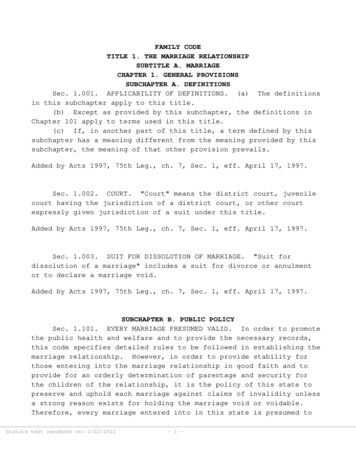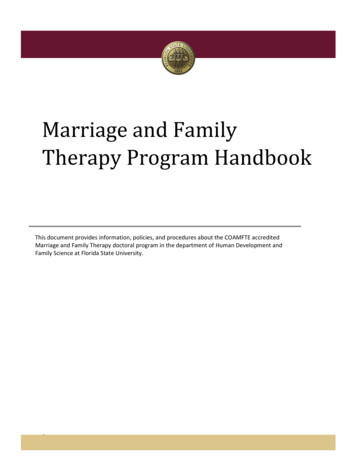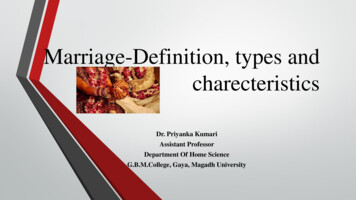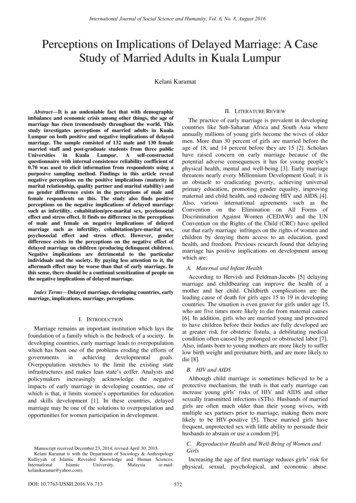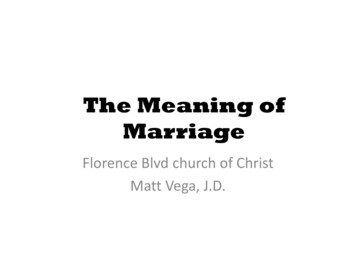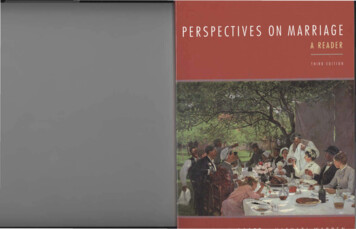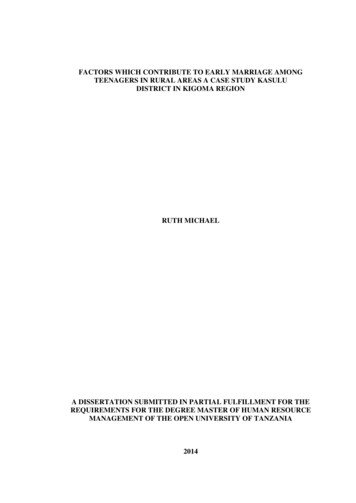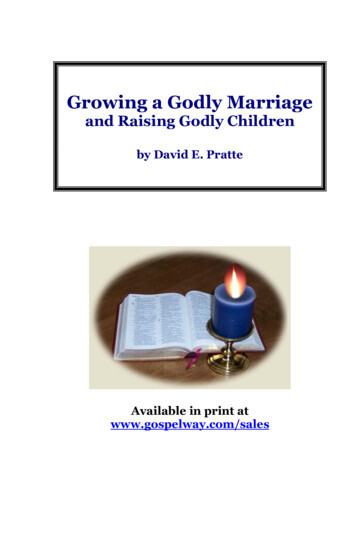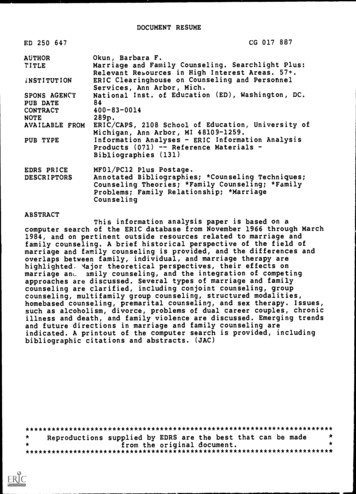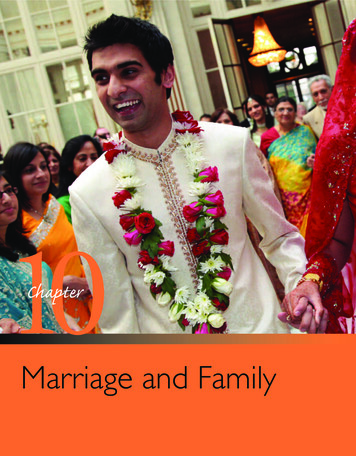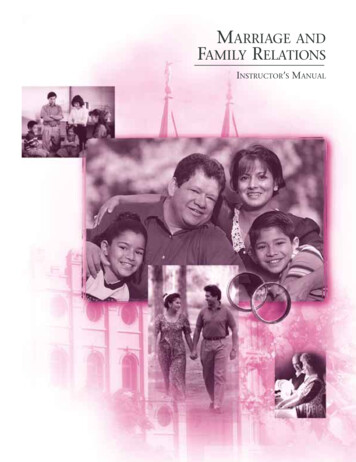
Transcription
School of Education and Professional StudiesStudent HandbookMARRIAGE ANDFAMILY THERAPY2022-2023DEPARTMENT OF COUNSELOREDUCATION AND FAMILYTHERAPYCENTRAL CONNECTICUT STATE UNIVERSITYNEW BRITAIN, CONNECTICUT
TableofContentsIntroduction .5"Grow With Us" .6General Information - CCSU .7The University .7The School of Education and Professional Studies .7The Department .7Diversity and the CCSU Marriage and Family Therapy Program .7CCSU Non-Discrimination Statement. 9Nondiscrimination in Education and Employment Policy.9Definitions .9Responsibility .9Description of the Program . 10Program Philosophy. . 10Student Learning Outcomes .11Program Format . 12What is a Marriage and Family Therapist? . 12MFT Job Market - What Does the Program Prepare a Student For?. 13Typical Jobs of MFT Graduates From CCSU - Where Will Jobs be Found Upon Graduation? . 13Requirements of Graduate Study . 14Matriculation, Prerequisites, and Degree Candidacy . 14Academic Advising. 14Graduation Requirements for the M.S. Degree. . 15The "Capstone Project": The Case Presentation. 15The Thesis Option. . 16Curriculum. 16Prerequisites and the Core Counseling Sequence. . 16Content Areas and Core Courses in the MFT Program . 16Course Descriptions .17Optional School-Based MFT Certification Courses . 20Clinical Training and Supervision Sequence. 21MFT Comprehensive Exam . 21Course Sequencing: The Evening Track. . 22Evening Track .21Marriage and Family Therapy Plan of Study by Semester (Full Time) .23MFT Program Summer Courses (Evening Track). . 24Evaluations .24Student Evaluations .24Program Evaluations .24Student File Documentation .25MFT Program Student File Documentation. .25AAMFT and Connecticut Licensure Considerations .26AAMFT Accreditation .26MFT Licensure in Connecticut .262
AAMFT Student Membership.26AAMFT Clinical Membership.27The AAMFT Code of Ethics and Expected Conduct .27School Certification for MFTs. .28CCSU Approved Offerings for MFTs in the Schools Certification Sequence.28Personal and Professional Growth .29Socialization Into a New Professional Identity .29A Word on Personal Therapy. .29Support Services for Students.30Graduate Student Association. .30MFT Student Representatives .30Delta Kappa Chi Honor Society.30Attendance at Conferences and Professional Meetings. .31Unique Offerings Through the CCSU MFT Program .31General Policies and Procedures .31Tuition and Refund Policies . 31Scholarships and Grants .31Non-Discrimination Policy .31Disclosure of Personal Information.32Probation. .32Grievance Policy .33Gatekeeping Policy .33Assessment of Professional Functioning and Behavior .34Probationary Process for the Department of Counselor Education and Family Therapy. .34Individual Remediation Plan .35School of Education and Professional Studies Temporary Suspension from Program and/orExperiential Learning Policy .35Important Points to Remember 37MFT Program Faculty .383
Appendices .39Appendix I: Admissions .40Appendix II: Counselor Competencies Checklist .42Appendix III: Clinical Field Placement List .47Appendix IV: Student File Verification Form .49Appendix V: Department Writing Guidelines .51Appendix VI: Graduate School Policies and Procedures .55Sample Planned ProgramsApplication for GraduationChange of Planned Program formChange of Program/Advisor formDegree Candidacy formGraduate School Summary SheetAppendix VI: CCSU Resources – Websites and Contact Information .61Declaration Page .634
IntroductionThis Student Handbook has been prepared to serve as a guide throughout the training process forstudents enrolled in the Master's program in Marriage and Family Therapy at Central ConnecticutState University's Department of Counselor Education and Family Therapy. The handbook isdesigned to provide detailed information about each stage of the process toward completing theMaster's degree and to informstudents about the unique characteristics of the program and the practiceof Marriage and Family Therapy.Each student is also assigned an academic advisor. The advisor will serve as a guide while the studentis in the Marriage and Family Therapy program. It is recommended that students make contact withtheir advisors periodically and utilize the faculty member's services. Students may meet with advisorsduring regularly scheduled office hours or by appointment.We hope that you find your experience at Central Connecticut State University an enlightening andfulfilling one. Suggestions on the part of all who use this handbook are encouraged. Please send yourcomments directly to:Dr. Tatiana Melendez-RhodesMFT Program CoordinatorDepartment of Counselor Education &Family TherapyCentral Connecticut State University1615 Stanley StreetNew Britain, CT 06050(860) 832-2256E-Mail: tatianam@ccsu.eduThe Department of Counselor Education & Family Therapy and Central Connecticut State University reserves the right torevise, amendor change items set forth in this handbook from time to time. Accordingly, readers of this handbook should inquire as to whether anysuch revisions, amendments or changes have been made since the date of publication. The University reserves the rightto cancel course offerings, to set minimum and maximum size of classes, to change designated instructors in courses and to makedecisions affecting the academic standing of anyone participating in a course or program offered by the University.5
DEPARTMENT MOTTO: "GROW WITH US"The department motto "Grow with us" was selected as the result of a student contest.It was chosenby the faculty from several other entries because it best reflects the vision and attitude that we wantto aspire to in the Department of Counselor Education & Family Therapy. The mission of ourdepartment derives from the mission of the counseling and family therapy professions (i.e., to promotethe dignity and welfare of all human beings and to help individuals and families to lead healthy,happy, meaningful, and self-sufficient lives). By fostering healthy human beings, we are, byextension, making for a better human society, with stronger families, stronger schools, and strongercommunities.While all citizens bear responsibility for building a better world, counselors and family therapistswillingly assume a larger share of this responsibility because they have chosen helping others astheir life’s work. As such, they are people of goodwill and compassion who have great respect forhuman dignity and diversity, are committed to promoting universal human rights and freedoms, andfor working for a sustainable human community that provides for the wellbeing of all its citizens.As your faculty and academic advisors, our greatest desire is to help you achieve your goals, notjust by succeeding academically, butalso by growing as self-aware and emotionally centered persons.We recognize that to be effective, we must also continue to grow. So, to the best of our ability, wepledge to practice the values espoused by the counseling and MFT professions, to live and practiceour profession with integrity, treat all people with abiding respect and dignity, and provide the kindof leadership that will help you become the best mental health professional and person you canbecome.So, come along, and grow with us6
General Information - CCSUThe UniversityFounded in 1849 as the New Britain Normal School - a teacher-training facility- CCSU isConnecticut's oldest publicly supported institution of higher education. It became the TeachersCollege of Connecticut in 1933, and after a period of extensive institutional growth and externalexpansion it became the Central Connecticut State College in 1959. In recognition of the institution'scontinual development in mission and aspiration, the present name and educational charter wereconferred in 1983. Honoring our "visionaryinnovations in undergraduate education," the Associationof American Colleges & Universities selected CCSU as one of only 16 "Leadership Institutions" inthe nation - and the only one in Connecticut.The School of Education and Professional StudiesThe Department of Counselor Education & Family Therapy is part of the School of Education andProfessional Studies (SEPS). The school offers both undergraduate and graduate programs that leadto teacher certification in the State of Connecticut and advanced programs in educational leadership,counseling, nursing, physical education and health fitness, reading and language arts, and specialeducation. Whether they are teachers, principals, counselors or nurses, all educational and humanservice professionals share the common purpose of facilitating the academic, career, and socialemotional growth of our nation's citizens. Consequently, an overarching conceptual framework thatprovides a philosophical and theoretical foundation for all programs, courses, candidate performance,scholarship, service and accountability guide all educational programs within the School of Educationand Professional Studies. The unifying theme for the conceptual framework is “Preparing Leadersfor Service in Our Communities”. This theme is a reflection of the university's mission to be "acommunity of learners dedicated to teaching and scholarship." The theme also underscores theexpectation that graduates from the school will offer service to their communities and will bethoughtful, responsible citizens. The Interim Dean of the School of Education and ProfessionalStudies is Dr. James Mulrooney.The DepartmentThe Department of Counselor Education & Family Therapy prepares students for professional careerin Clinical Professional Counseling, School Counseling, Marriage and Family Therapy, and StudentDevelopment in Higher Education. Courses are designed to develop student competence in theapplication of theory-based counseling models, to understand the concerns of diverse clientpopulations and to enhance students' personal and professional development. All programs havepracticum experiences and clinical internships that provide students with valuable opportunities toapply their skills in a field-based setting under close supervision. The Chair of the Department is Dr.Cherie King.Diversity and the CCSU Marriage and Family Therapy ProgramThe Marriage and Family Therapy program at Central Connecticut State University defines humandiversity as: “perceived variability along any category or dimension which differentiates individual7
persons, or groups of persons, one from another.” Insofar as all human beings are unique, diversity isa ubiquitous phenomenon resulting from the universal habit of perceiving differences bothconsciously and unconsciously. Awareness of diversity itself is neither a virtue nor a problem.However, judgment accompanying such awareness of diversity can be problematic, particularly whensuch judgments entail presumptions of superiority or inferiority, or expectations unfounded by directexperience with the particular individuals or groups perceived as similar or different from theperceiver. Historically, injustices have resulted from two broad types of acts: (1) those that result fromunfounded judgments of specific persons or groups from the perceiver and (2) those that establishpolicies which result in favor or disfavor to persons or groups from any one or more category ordimensions.Some of the major categories that have been attended to with consequent injustices are: Race, religion,national origin, ethnicity, gender, socioeconomic class, sexual orientation, and political belief. Someof the major dimensions are: Age, height, weight, physical attractiveness, and skin tone. We refer tosuch variables as HCADs (Historical Categories and Dimensions). The Marriage and Family Therapy(MFT) program is deeply committed, as is Central Connecticut State University of which we are apart, to the goal of maximal opportunity for all persons, irrespective to their membership in anyperceived categories and dimensions. To this end, our program has adopted a policy of admissions toanyone having earned a Baccalaureate degree from an accredited institution with a G.P.A. of 2.7 orbetter, along with favorable recommendations and a well-written essay. Recognizing that economiccircumstances limit some persons from attending our program, we encourage students to seekfinancial aid and offer a limited number of graduate assistantships. To our knowledge, graduateeducation, at the two Connecticut State University MFT programs are the most affordable of any inthe state.Central Connecticut State University prides itself on its diversity and its emphasis on the “Nontraditional Student.” Most of the courses in the program are offered in the evenings; some are offeredduring Intersession and summer and occasionally weekends. The program is designed to allow bothstudents to stay together as a “cohort” through critical stages in their training, thus creating anatmosphere of cohesiveness and connection to each other and the program. Students value thisatmosphere, finding that it generates support, reinforcement, collegiality, and a sense of “ownership”in the program. Since the mid-1990’s, our program has attracted a student body diverse with respectto all the above-mentioned HCADs. We offer coursework that addresses the importance of respectfor all persons; we support our MFT graduate student organization, which provides social as well asprofessional activities open to all. We encourage our students to inform their communities about ourprogram, a policy which has resulted in continued HCAD diversity of our student body with respectto HCADs. We facilitate both practicum and internship placements with agencies that service anHCAD-diverse population.Our program student body consists of over 20% males and over 35% non-European-Americans,which attests to the success our policies allow us to enjoy in regard to racial and ethnic diversity.Because of our emphasis on diversity, our program attracts students of all walks of life, culturalbackgrounds, and ethnic origins. We have attracted students from all over the world, and have hadstudents in our program representing such countries as Bangladesh, Brazil, Canada, China, Columbia,India, Iran, Israel, Italy, Japan, Nicaragua, Peru, Poland, Russia, South Africa, South Korea, Spain,Syria, Turkey, Vietnam, and the West Indies.8
Our program faculty and clinical site supervisors are diverse along many dimensions of the historicalcategories and dimensions as stated above. Regarding our faculty, we are diverse in respect to age,gender, ethnicity, religious affiliation, educational backgrounds, clinical experiences, and many otherHCADs.The program offers a broad selection of clinical placements across the State of Connecticut indiverse settings as urban, suburban, and rural settings, and across the spectrum of clinical venues.Students have the opportunity to work with minority clients and field supervisors.Nondiscrimination in Education and Employment PolicyIn accordance with Section 46a-68-46 of the Affirmative Action Regulations of Connecticut StateAgencies, the following procedures provide an internal process for the handling of complaintsinvolving claims of discrimination or harassment, including sexual misconduct/violence. Thisprocedure is designed to further implement Central Connecticut State University (CCSU) policiesrelating to Nondiscrimination in Education and Employment, Sexual Harassment and SexualMisconduct by providing a process through which individuals alleging violation of these policiesmay pursue a complaint. This includes allegations of retaliation, discrimination, harassment basedon age; ancestry, color; gender identity and expression; intellectual disability; learning disability;mental disability; physical disability; marital status, national origin; race; religious creed; sex,including pregnancy, transgender status, sexual harassment and sexual assault; sexual orientation;veteran status; or any other status protected by federal or state laws When responding to an internalcomplaint, disclosure of information relating to the internal complaint and the identity of thecomplainant will be handled with appropriate sensitivity and in accordance with applicable laws.DefinitionsDiscrimination. Discrimination is defined as conduct that is directed at an individual because of hisor her protected class and subjects the individual to different treatment so as to interfere with or limitthe ability of the individual to participate in, or benefit from, the services, activities, or privilegesprovided by theuniversity or otherwise adversely affects the individual's employment or education.Discriminatory Harassment. Discriminatory harassment is defined as verbal or physical conduct thatis directed at an individual because of his or her protected class, and that is sufficiently severe,persistent or pervasive so as to have the purpose or effect of unreasonably interfering with anindividual's work or academic performance or creating an intimidating, hostile or offensive work oreducational environment.Retaliation. Retaliation is subjecting a person to a materially adverse action because he or shemade acomplaint under this policy or assisted or participated in any manner in an investigationunder this policy.ResponsibilityThe responsibility for implementation of this policy is assigned to the Chief Diversity Officer, whomay delegate duties as appropriate. The Office of Equity & Inclusion will promptly address eachcomplaint and make reasonable efforts to expeditiously affect a resolution. The investigation of suchcomplaints will be managed with appropriate sensitivity.9
Description of the ProgramProgram Philosophy.The Marriage and Family Therapy program at Central Connecticut State University (CCSU) is designed toprepare students for professional careers as Marriage and Family Therapists in a wide variety of settings androles. First, students are taught theories and techniques of practice in individual and group counselingmodalities, as well as developmental theory. The foundation of the specialized training in Marriage and FamilyTherapy is Systems Theory, serving as the linchpin for the study of clinical theories and practices that aretaught in preparation for clinical training. The philosophy of the program is that a student must integratetheories and techniques as tools for enhancing one's effectiveness as an agent of intervention and change. Theprogram does so by interweaving theory and practice throughout the duration of the training process viagraduated practical experiences while studying theory. Thus, through the process of study and practice, thestudent has an opportunity to incorporate a wide array of learnings gradually and comprehensively. The endproduct of such training is a therapist who is well-grounded in theory, and who has had the nurturing throughan on-going training and supervisory process to use him- or herself effectively, professionally, and ethically asan agent of change at a variety of levels.Mission, Goals, and Outcomes – Central Connecticut State University M.S. MFT ProgramCCSU University MissionCentral Connecticut State University is a community of learners dedicated to teaching andscholarship that emphasizes development and application of knowledge and ideas through researchand outreach activities, and prepares students to be thoughtful, responsible and successful citizens.Asa comprehensive public university, we provide broad access to quality degree programs at thebaccalaureate, master's, and doctoral levels.CCSU MFT Program MissionThe mission of the CCSU MFT Program is to provide quality training in MFT education thatpromotes entry-level competence at the point of graduation. To accomplish this end, theprogram is committed to advancing and disseminating the Metaframeworks paradigm as avalued systemic basis for teaching and practicing marriage and family therapy, promotingculturally informed, ethical, and respectful systemic mental health practice, and promotingleadership in the MFT field among our students, faculty, and graduates.10
Program Goal 1: Knowledge and ResearchStudents will develop competence in thedelivery of MFT services, including proficiencyin:(1) applying systems thinking in caseformulation, (2) utilizing systemic models andinterventions, (3) utilizing findings of MFTresearch to inform clinical practice and (4)Self- reflection and self-improvement astherapists.Program Goal 2: Systemic/Integrative PracticeStudents will develop competency in utilizingthe integrative Metaframeworks1 paradigm inassessment, treatment planning andapplication of systemic models of marital andfamily therapy.Program Goal 3: EthicsStudents will develop an understanding of andidentify ethical issues that arise in academicand clinical practice based on the AAMFTCode of Ethics and state and federal lawsapplicable to the practice of marital and familytherapy.Student LearningOutcomesSLO #1: Students will become knowledgeable in the major schoolsofmarriage and family therapy;SLO #2: Students will develop proficiency in practice ofsystemically oriented therapy approaches to be applied in theirclinical work with individuals, families and communities.SLO #3: Students will become knowledgeable consumers of researchand evidence-based clinical practice.SLO #4: Students will demonstrate self-awareness of their own sociallocation (i.e., internal and relational) and identify biases that informtheir clinical practice. Based on this self-awareness, students willdemonstrate the ability to self-correct or be open to supervisory andpeer feedback.SLO #5: Students will demonstrate the ability to assess a clientsystem’s resources and constraints through the “lenses” of the 6 coreMetaframeworks domains (i.e., Organization, Sequences,Development, Multicultural, Gender and Internal Family System),select intervention strategies from systemic family therapy models thatare appropriate and aligned with the removal of identified constraints,and implement interventions from such models based on their uniqueMetaframeworksassessment.SLO #6: Students will demonstrate the ability to recognize ethicaldilemmas in professional practice, apply relevant AAMFT Code ofEthics and models of ethical decision making when ethical issuesemerge.Program Goal 4: DiversityStudents will develop cultural competencein Marital and Family Therapy practice.SLO #7: Students will demonstrate an awareness of and respect forcultural differences among clients and their contexts as defined in
the dignity and welfare of all human beings and to help individuals and families to lead healthy, happy, meaningful, and self-sufficient lives). By fostering healthy human beings, we are, by extension, making for a better human society, with stronger families, stronger schools, andstronger communities.
